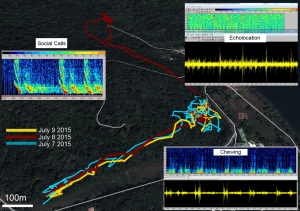Do you know anyone who might be interested in a position studying the foraging behavior of frog-eating bats? If so, keep reading this update to my last post.
First, some background: the position is working with two of the best young scientists working with bat behavior. Yossi Yovel’s lab in Tel Aviv, Israel have invented the most exciting new technologies for studying bat behavior that I’ve ever seen. His lab is continually developing miniaturized modular tracking devices that can be mounted on free-ranging bats. The devices can integrate GPS, ultrasound microphones, barometric pressure, and even EEG signals from the bat’s brain. Yossi is deploying these devices on bat species all over the world that vary in their foraging ecology (from aerial hawking insectivores to fishing bats that hunt over the ocean and now bats that glean large insects and frogs). Yossi’s ability to integrate engineering and robotics with bat ecology and neuroscience leads to some jaw-dropping results.
Rachel Page’s lab in Panama is developing one of the best long-term model systems in cognitive ecology: the frog-eating bat. She does some of the most clever and most theoretically interesting cognition experiments with bats that I know about. Read more about that in my last post.
Their idea was simple: apply Yossi’s novel methods to Rachel’s well-developed study system. But you need someone to lead this project.
This last month I helped Yossi and members of Rachel Page’s lab to conduct a pilot study where we mounted these tracking devices on frog-eating bats. We tracked 3 bats for 2-3 days. I was worried that the GPS signals would not work through the forest canopy, but they performed better than I expected. Here is a quick image Yossi threw together after quickly scanning the data from one of the bats foraging on 3 nights.

Wow! From just these 3 days, one can already learn so much about the behavior of a wild frog-eating bat. Where did it go? When was it feeding? Where was it communicating with others? The next big step is to conduct field experiments that manipulate their behavior in the wild to tell us about the flexibility of their foraging strategies. We already know this is possible because Rachel’s lab uses playbacks to call the bats into their nets to capture them.
Yossi and Rachel had originally hired me to lead this project, but alas– I ultimately decided to continue my work on sensory and social cognition in vampire bats (more on that project later). But this was an excruciating decision, because I still believe this is a great opportunity.
So now Yossi and Rachel are looking to hire someone else. Ideally, this person would start by or before Spring 2016. The best possible applicant would be someone who has neotropical field experience with bats and radiotracking, and has the ability (or interest in developing the ability) to conduct data analyses in Matlab.
If you know anyone that is interested, pass this information along. If you are interested, feel free to contact Yossi and Rachel directly via their websites.
